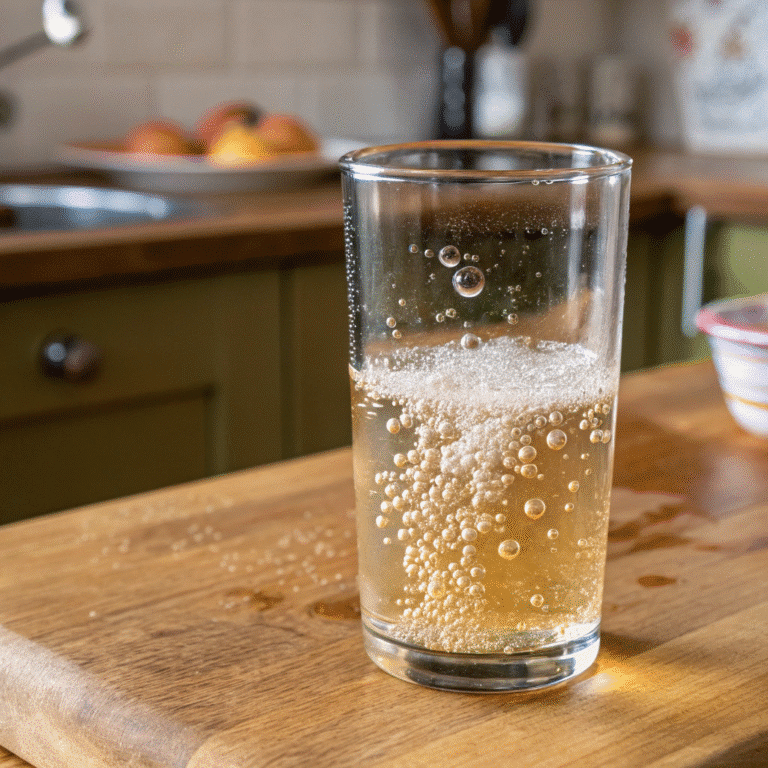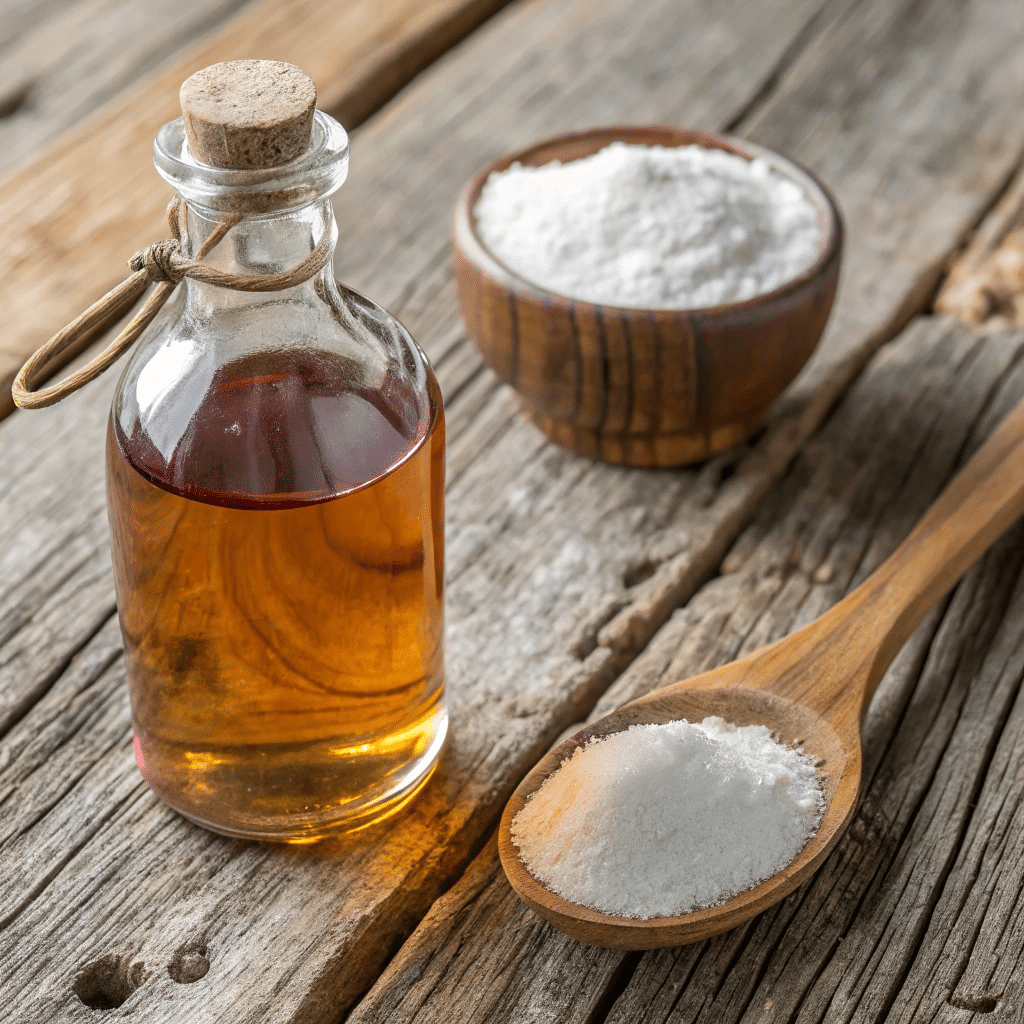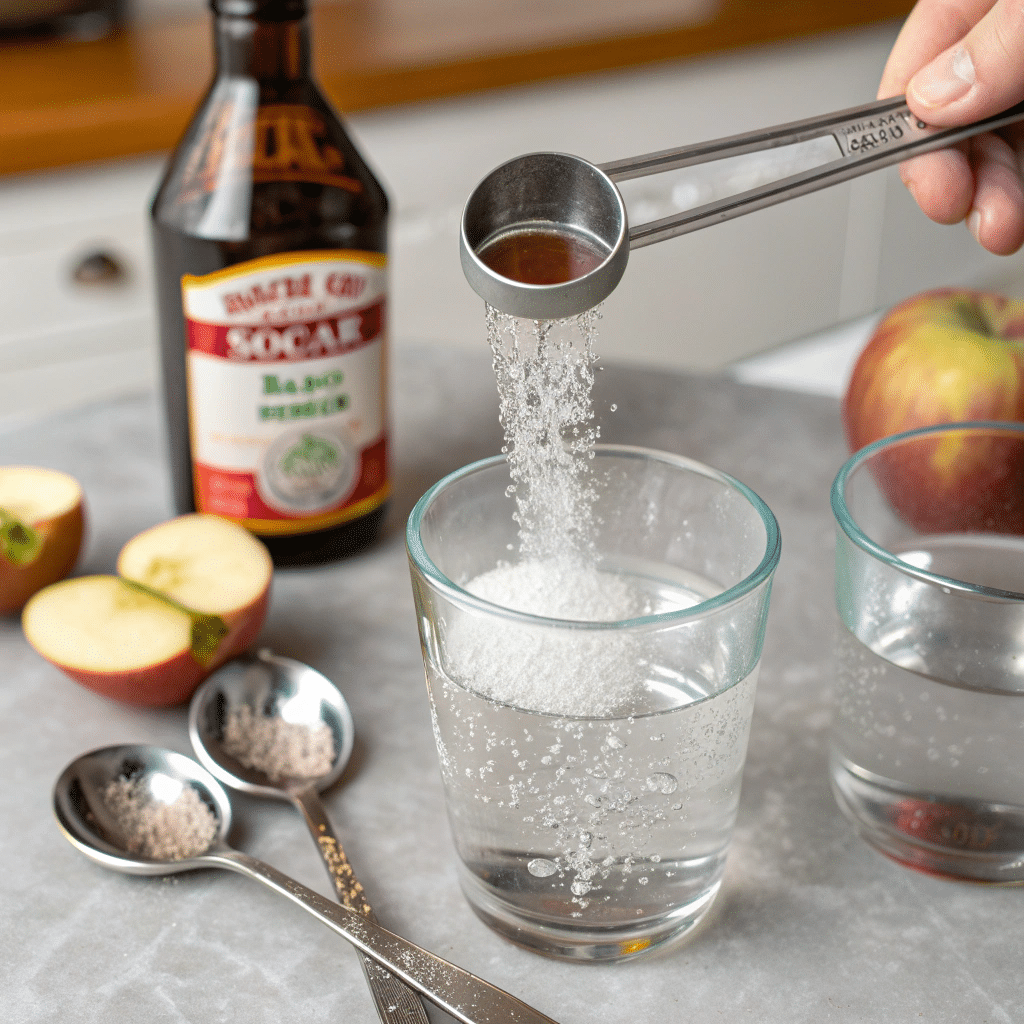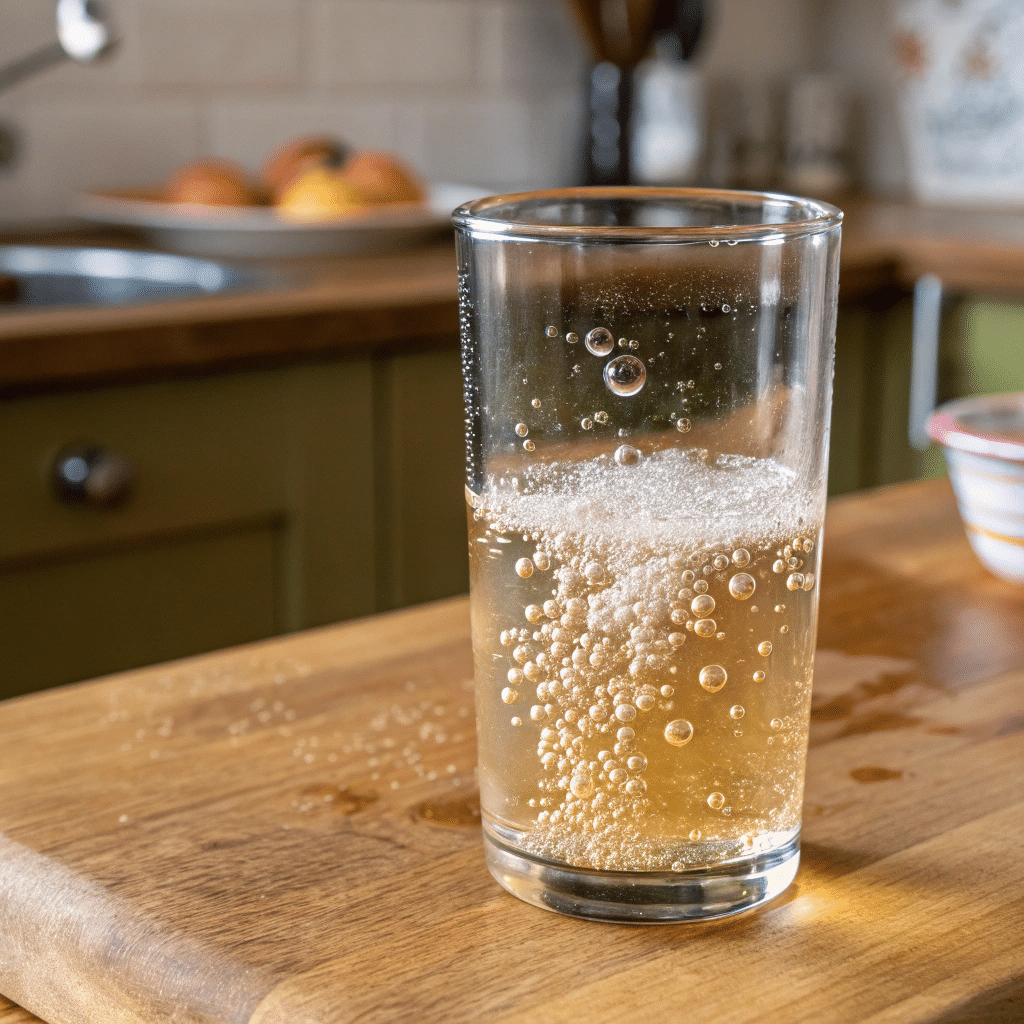For years, people have been mixing baking soda and apple cider vinegar in hopes of unlocking health benefits ranging from better digestion to easier weight loss. Some swear by the fizzing drink as a natural cure-all, while others question whether it’s truly effective—or even safe. This article dives deep into the science, myths, and practical uses of this popular combo. We’ll look at how it works in the body, the possible pros and cons, and the right way to use it without risking your health.
If you’ve ever wondered whether sipping this mix is a harmless home remedy or a wellness trend gone too far, keep reading. Looking for inspiration? Try this Baking Soda Trick for Men Recipe that’s also trending for its detox power.
Table of Contents
ToggleUnderstanding Baking Soda and Apple Cider Vinegar
What is Baking Soda?
Baking soda, or sodium bicarbonate, is a natural alkaline substance used in cooking, cleaning, and even sports performance. When consumed in small amounts, it can neutralize stomach acid, which is why some people use it as a quick fix for heartburn. However, overdoing it can raise sodium levels and cause unwanted side effects.
What is Apple Cider Vinegar?
Apple cider vinegar (ACV) is made through the fermentation of apple juice, creating a liquid rich in acetic acid. It has been linked to potential benefits like improved blood sugar control, modest weight reduction, and antimicrobial properties. While many people drink it for wellness, ACV’s acidity can be harsh on teeth and the digestive tract if not diluted.
Why Do People Combine Them?
When these two ingredients are mixed, a chemical reaction occurs—producing fizz as carbon dioxide gas is released. Advocates believe this mixture combines the best of both worlds: the alkalizing effect of baking soda and the metabolic support of vinegar. But the truth is more complex, and that’s what we’ll uncover in the next parts of this article.
Print
Baking Soda and Apple Cider Vinegar: Benefits, Risks, and Safe Uses
5 Stars 4 Stars 3 Stars 2 Stars 1 Star
No reviews
A fizzy, natural health tonic made from baking soda and apple cider vinegar, believed to aid digestion, support metabolism, and act as a mild detox drink when used properly.
- Total Time: 2 minutes
- Yield: 1 serving 1x
Ingredients
1/2 to 1 teaspoon baking soda
1 to 2 tablespoons apple cider vinegar (raw, unfiltered)
8 to 10 ounces filtered water
Ice (optional, for taste)
Straw (recommended for dental safety)
Instructions
1. Pour the apple cider vinegar into a large glass.
2. Add baking soda slowly to avoid overflow as it fizzes.
3. Once the fizzing subsides, pour in the filtered water.
4. Stir well to combine.
5. Add ice if desired and drink with a straw.
6. Consume 20–30 minutes before meals or first thing in the morning.
7. Do not exceed 1 teaspoon of baking soda per serving.
Notes
Always dilute this mixture to avoid potential irritation to teeth and digestive tract.
Drink with a straw and rinse your mouth with water afterward to protect enamel.
Avoid daily use unless approved by a healthcare provider.
Do not take on an empty stomach if you have sensitive digestion.
This drink is not recommended for people with high blood pressure, kidney issues, or those on medications without medical approval.
- Author: Jessica Lupone!
- Prep Time: 2 minutes
- Cook Time: 0 minutes
- Category: Drink
- Method: Stirred
- Cuisine: Home Remedy
Nutrition
- Serving Size: 1 glass
- Calories: 5
- Sugar: 0g
- Sodium: 300mg
- Fat: 0g
- Saturated Fat: 0g
- Unsaturated Fat: 0g
- Trans Fat: 0g
- Carbohydrates: 1g
- Fiber: 0g
- Protein: 0g
- Cholesterol: 0mg
Health Benefits of Baking Soda and Apple Cider Vinegar
Digestive Health and Acid Balance
Many people use this mix to ease indigestion or heartburn. Baking soda neutralizes stomach acid, while apple cider vinegar slows stomach emptying, which may help reduce bloating and improve satiety. Together, they may provide short-term relief for occasional digestive discomfort.
Weight Management and Appetite Control
Apple cider vinegar has been studied for its potential to support weight management. Research suggests it may help control blood sugar levels and reduce appetite by prolonging the feeling of fullness. When combined with baking soda, some people believe the drink further promotes satiety, though scientific evidence remains limited.
Blood Sugar Regulation
ACV alone has shown promise in stabilizing blood sugar spikes after meals. This makes it particularly interesting for individuals concerned with prediabetes or type 2 diabetes. Adding baking soda doesn’t amplify this effect, but it can make ACV more palatable by lowering its acidity.
Possible Heart and Circulatory Benefits
Though studies are limited, ACV may help lower cholesterol and triglyceride levels, while baking soda’s alkalizing properties are thought to support overall metabolic function. For men, improved circulation is sometimes tied to enhanced performance and energy levels, but evidence here is more anecdotal than scientific.
Antimicrobial Properties
Apple cider vinegar has long been valued for its ability to fight bacteria. Historically, it was even used for food preservation. Some people use diluted ACV as a natural household cleaner or skin tonic. While drinking the mixture isn’t a proven way to fight infections, it may offer some mild antibacterial support.

Risks and Side Effects of Mixing Baking Soda and Apple Cider Vinegar
Chemical Reaction and Digestive Discomfort
When baking soda (a base) and apple cider vinegar (an acid) mix, they create carbon dioxide gas. If you drink the mixture before the fizz subsides, it can lead to bloating, gas, and stomach discomfort. This makes timing and preparation important if you choose to consume it.
High Sodium Content
Baking soda is rich in sodium. Drinking it regularly can increase your daily salt intake, which may raise blood pressure or strain the kidneys. For people with hypertension or kidney disease, frequent use of this mixture can pose real health risks.
Tooth Enamel Erosion
ACV is highly acidic. Even when diluted, it can gradually erode tooth enamel if consumed frequently. Adding baking soda reduces the acidity slightly, but not enough to eliminate the risk. That’s why experts recommend drinking the mixture with a straw and rinsing your mouth with water afterward.
Risk of Metabolic Imbalance
Overconsumption of baking soda can cause a condition known as metabolic alkalosis, where the body becomes too alkaline. Symptoms may include muscle twitching, nausea, and confusion. While rare, this is a serious concern if the drink is taken excessively.
Medication Interactions
Both baking soda and ACV may interact with medications. For instance, baking soda can interfere with how the body absorbs certain drugs, while ACV may alter insulin sensitivity or potassium levels. Anyone on prescription medication should consult a healthcare professional before trying this mixture.
Recommended Ratios and How to Use Baking Soda and Apple Cider Vinegar Safely
The Common Ratio for Daily Use
A widely mentioned recipe combines 1 teaspoon of baking soda with 2 tablespoons of apple cider vinegar in a large glass of water. This ratio creates fizz but eventually settles into a milder drink that’s easier on the stomach than vinegar alone.
Ratio for Weight Loss Claims
Some sources recommend a smaller amount of baking soda, such as ½ teaspoon of baking soda mixed with 1 tablespoon of apple cider vinegar in 8–10 ounces of water. This blend is often promoted as a weight loss aid, though scientific proof for fat burning is lacking. What it may do is promote satiety, leading to fewer calories consumed during the day.
Best Time to Drink the Mixture
- Morning use: Many prefer drinking it before breakfast to kickstart digestion.
- Before meals: Some drink it 20–30 minutes before eating to reduce appetite.
- Post-workout: Rarely, athletes take small doses for endurance, though baking soda loading is controversial.
Tips for Safe Consumption
- Always dilute the mixture in plenty of water.
- Drink with a straw to minimize contact with teeth.
- Avoid daily long-term use without medical advice.
- Never exceed 1 teaspoon of baking soda at a time.
Who Should Avoid It
- People with high blood pressure or kidney problems should not consume baking soda regularly.
- Those on medications for diabetes or heart conditions should avoid it unless approved by a doctor.
- Pregnant women and children should steer clear of this mix unless guided by a healthcare professional.
Looking for a clean, low-impact health drink? Try our Natural Ozempic Recipe as a rotation option.

Baking Soda and Apple Cider Vinegar for Specific Conditions
Men’s Health and Performance
For men, the combination of baking soda and apple cider vinegar is often linked to energy, circulation, and even sexual health. While there’s no hard proof that the mix directly boosts testosterone or erectile function, apple cider vinegar may indirectly help by supporting healthy cholesterol levels and blood sugar regulation. Baking soda, on the other hand, is sometimes used by athletes for short bursts of high-intensity performance due to its alkalizing properties.
Digestion and Acid Reflux Relief
One of the most common reasons people turn to this drink is acid reflux relief. Baking soda neutralizes excess stomach acid, while apple cider vinegar may improve stomach emptying and gut health through its acetic acid. Together, they might balance acid levels, but this effect is short-term and should not replace prescribed treatments.
Weight Loss Support
Apple cider vinegar has been shown to help people feel fuller, which can lead to reduced calorie intake over time. The addition of baking soda doesn’t directly burn fat, but it may make ACV easier to consume regularly by softening its acidity. This is why many weight loss enthusiasts try the combination.
Blood Sugar and Metabolic Health
Studies suggest that ACV may lower blood sugar spikes after meals and improve insulin sensitivity. While baking soda doesn’t enhance this effect, drinking it with vinegar can make it more tolerable for those sensitive to acidity. Over time, this could help support better metabolic control when paired with diet and exercise.
Detox and “Alkalizing” Myths
Some advocates claim this mixture detoxifies the body or alkalizes blood pH. In reality, the human body tightly controls its internal pH, and no drink can override that. The “detox” effect is more likely due to digestive stimulation and increased hydration rather than any chemical cleansing.
Don’t miss our natural metabolism booster—the Natural Ozempic Recipe, a great companion to this combo.
Conclusion
The combination of baking soda and apple cider vinegar has gained attention as a natural remedy for digestion, weight loss, and overall wellness. While some people find benefits, it’s not a magic cure. The mixture can help with short-term relief, satiety, and even cleaning tasks around the home, but it also carries risks if consumed in excess.
As with any health trend, moderation is key. Use this mixture occasionally, always diluted, and consult a doctor if you have existing health conditions. For many, apple cider vinegar alone may provide similar benefits without the added risks of baking soda.
Don’t miss our in-depth look at the Natural Ozempic Recipe—another smart addition to your all-natural wellness stack.
For more recipes Follow me in our Social media
Facebook: https://www.facebook.com/profile.php?id=61573913076847
Pinterest: https://www.pinterest.com/momandgrandmacooks/
Medium: https://medium.com/@momandgrandmacooks
Frequently Asked Questions About Baking Soda and Apple Cider Vinegar
What are the benefits of drinking baking soda and apple cider vinegar?
Drinking the mixture may offer short-term relief for indigestion, help with satiety, and support blood sugar regulation. Apple cider vinegar provides antimicrobial and metabolic benefits, while baking soda neutralizes stomach acid. However, evidence is limited, and overuse can carry risks.
What does baking soda and apple cider vinegar do for a man?
For men, the effects are largely the same as for anyone—better digestion, possible weight support, and improved blood sugar control. Some suggest it may boost circulation and energy, which could indirectly support male health, but these claims are mostly anecdotal.
What is the ratio of apple cider vinegar and baking soda for weight loss?
A common mix is 1 tablespoon of apple cider vinegar with ½ teaspoon of baking soda in a glass of water. Another version is 2 tablespoons of ACV with 1 teaspoon of baking soda. Always dilute in at least 8–10 ounces of water to reduce acidity and minimize side effects.
What happens if you mix baking soda and apple cider vinegar?
The two ingredients react immediately, producing fizz as carbon dioxide gas is released. This reaction reduces the acidity of vinegar, making the drink easier to consume. However, drinking it too quickly may cause bloating and gas.








